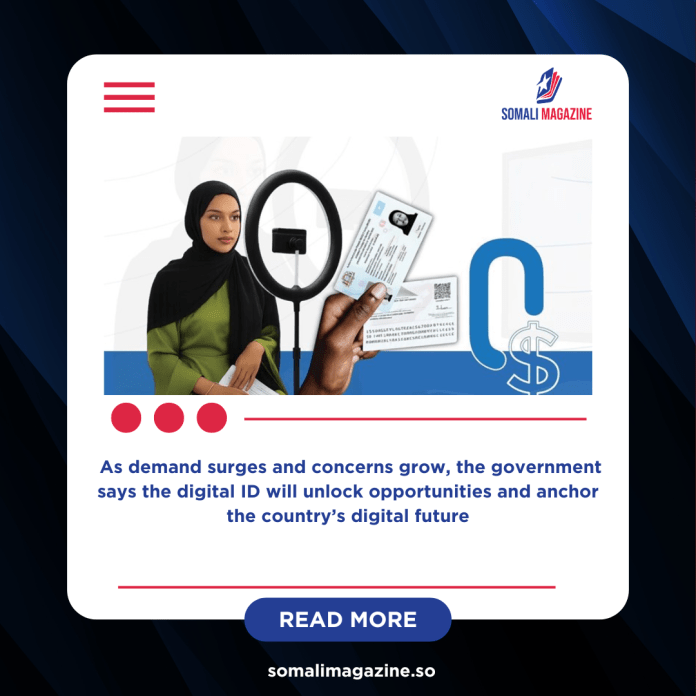Facebook Twitter (X) Instagram Somali Magazine - People's Magazine
Somalia is rolling out new biometric national identity cards that will eventually replace passports as the country’s main form of identification, a move officials say is crucial for improving digital services and making it easier for people to access everyday necessities. The National Identification and Registration Authority (NIRA) began issuing the cards in September 2023, but demand has sharply increased as the IDs become mandatory for passports starting September 1, 2025, and for domestic travel on January 1, 2026. The government says the cards will also be needed for banking, education, business licensing, and many public and private services.
NIRA estimates that 85% of Somalia’s 19.7 million people currently have no formal ID. The new card provides each person with a lifetime 11-digit number and is available as both a physical and digital ID. NIRA Director General Abdiwali Ali Abdulle says the system will remove barriers that prevent citizens from getting basic services and will form the backbone of Somalia’s future digital infrastructure.
The rollout has resulted in long queues at registration centers in Mogadishu and some regional states. Many people arrive before dawn and still wait for hours due to high demand. Some applicants said they were returning multiple times because the process is slow, while parents rushed to register teenagers who will soon need the card for school and university admissions. President Hassan Sheikh Mohamud has promised more mobile registration teams, and several banks have been turned into enrollment centers to ease congestion. Registration is free, which has further increased turnout.
However, the timing of the program has raised concerns. Some citizens believe the rollout is linked to preparations for the expected 2026 one-person-one-vote elections. They worry that the new ID could later be tied to voter registration or used for political advantage. Others say the government did not provide enough public awareness, creating confusion between the national ID and the electoral card. NIRA officials deny any political motive, insisting the ID is a long-term national document for accessing services, not an election tool.
Another issue fueling debate is data security. The system was built with technical support from Pakistan’s NADRA, raising questions about privacy and storage. NIRA says all data remains in Somalia and is protected. Digital rights experts warn that without strong legal oversight, the system could exclude vulnerable groups such as internally displaced people or nomadic communities who struggle to access registration centers. Rapidly linking essential services to the ID could also widen inequality if many people are still unregistered.
Experts suggest that Somalia should ensure transparency and set up community-based and mobile registration centers to reach remote populations. They recommend simplifying the registration process, improving digital education, and partnering with local groups to reduce exclusion. They also warn that Somalia must strengthen its Data Protection Authority, created under the 2023 Somali Data Protection Law, to prevent misuse of personal data and build citizens’ trust.
Somalia’s experience mirrors challenges faced by other African countries that rolled out digital ID systems, such as Kenya and Ghana, which dealt with delays, privacy concerns, low digital literacy, and limited registration capacity. Somalia is already experiencing similar problems, including long waits for ID cards, overcrowded centers, and reports of people charging bribes to “speed up” registration.
Despite these challenges, the government sees the new ID as the foundation of a broader digital future. Once fully implemented, it could unlock digital payment systems, e-health platforms, and online education tools. It may also support Somalia’s integration into the East African Community by eventually enabling regional travel using the national ID, as is already the case in several EAC countries.
Authorities say the success of the program will depend on good governance, transparency, and strong data protections. If implemented effectively, Somalia could set an example for building secure and inclusive digital systems in the region.

